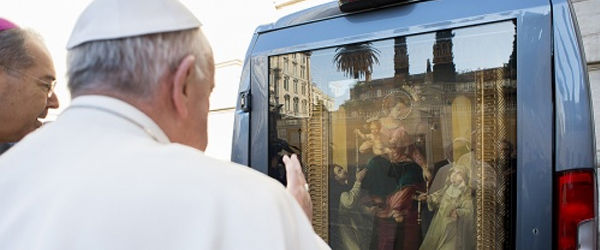After a daylong series of panel discussions May 2 at The Catholic University of America about the historic and contemporary context of the 1891 encyclical that is considered the groundwork for the church's social teaching, a final session put the previous discussions into context.Cardinal Peter Turkson, president of the Pontifical Council for Justice and Peace, said at a May 3 closing program that current times call for renewed efforts to fulfill the demands of "Rerum Novarum."He noted that the main functions of the state in the time of Pope Leo XIII and today are: pursuit of the common good, "which is not reduced to one's nation but considered from a world standpoint; awareness that this good cannot be limited to material goods but must include the moral good of society;" placing priority on people and families; respecting the free initiative of people; and aiding the neediest in society.Putting those priorities into effect is necessary in these times, he said.In an earlier interview with Catholic News Service and the National Catholic Reporter, Cardinal Turkson fleshed out some of the themes of his remarks to the conference. He said numerous recent events point to the need for the modern world to take to heart the lessons of "Rerum Novarum." The efforts in several U.S. states to do away with collective bargaining by state employees and huge demonstrations in Italy and England at the beginning of the year mounted by students who were worried about their ability to find work are examples of insecurity among workers in many parts of the world, the cardinal said.'"Rerum Novarum' has won admiration and interest precisely because it lays down basic rules of the social question," Cardinal Turkson said, particularly "how is human dignity ensured in the midst of turmoil?"Questions about worker rights, about the role of government in overseeing various aspects of society and about the power of capitalism come down to always ensuring human dignity, he said. "For me the criteria is how people are treated," he said. "A society decides to entrust to a government ... to give it a mandate to ensure their well-being. I tend to judge every government by how well that government treats its own citizens."A government should not interfere with its citizens, but it has an obligation to ensure their well-being and to protect them from becoming victims, including at the hands of unscrupulously run businesses, he said. "Governments at the end are judged by how well their citizens live, and how happily."In one of two responses to Cardinal Turkson's formal remarks, Bishop Stephen E. Blaire of Stockton, Calif., said workers today face an economic revolution, much as was the case in the time of Pope Leo XIII. Bishop Blaire, who chairs the U.S. bishops' Committee on Domestic Justice and Human Development, said "the current revolution is a technological one.""Global poverty envelops the earth," he said. "Millions are unemployed. Working conditions around the globe are often deplorable. Church-state relationships in many instances are adversarial."An example of the current needs for the teachings of "Rerum Novarum" lies in the needs of the poor in this country to have a voice on Capitol Hill amid budget and financial reform, said Bishop Blaire. "The poor have no lobbyists with huge bank accounts to speak for them."He cited the creation by more than 40 Christian leaders a week earlier of a "Circle of Protection," a plan to stand with the poor amid budget cuts. "It requires shared sacrifice by all, including raising adequate revenues, eliminating unnecessary military and other spending and addressing the long-term costs of health insurance and retirement programs fairly," he said, citing the statement of the group.John Sweeney, president emeritus of the AFL-CIO, echoed his keynote address from the earlier session of the conference.He cautioned that at the time of "Rerum Novarum," "untrammeled capitalism" had changed the relationship between "master and worker," the result of unregulated industries and failed systems.Today, the problem is that for the past 30 years, some industries "have been waging all-out war" against the gains workers got through the growth of unions in earlier generations."Rerum Novarum" and later documents such as the 1986 pastoral letter "Economic Justice for All" by the U.S. bishops were powerful tools in shaping how the church and society responded to needs of the poor, by starting from a focus on human dignity, Sweeney said. It's time for the church to re-emphasize "Rerum Novarum," he continued. "Let us remind our entire church that 'Rerum Novarum' is not a cafeteria of suggestions and ideas from which we are free to pick and choose," he said, "but the modern expression of an unbroken line that stretches from the Book of Genesis, throughout the Old Testament, to the teachings of our Lord Jesus Christ himself."Sweeney also urged a renewed partnership between church and labor, "if the labor movement is to survive and perpetuate our mission of being what amounts to an action arm of Catholic social teaching.—CNS{gallery width=100 height=100}gallery/2011/0513/rerum/{/gallery}

